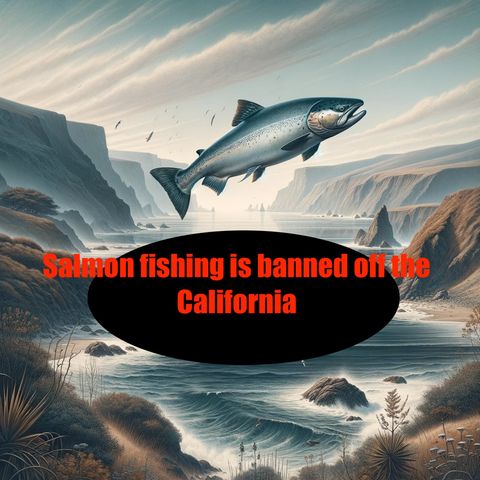California Bans Salmon Fishing Again

Descarga y escucha en cualquier lugar
Descarga tus episodios favoritos y disfrútalos, ¡dondequiera que estés! Regístrate o inicia sesión ahora para acceder a la escucha sin conexión.
California Bans Salmon Fishing Again
Esta transcripción es generada automáticamente. Ten en cuenta que no se garantiza una precisión absoluta.
Descripción
Salmon Fishing Ban in California Extended for Second Consecutive Year Due to Declining Populations In a unanimous decision that has sent shockwaves through the state's fishing industry, the Pacific Fishery...
mostra másIn a unanimous decision that has sent shockwaves through the state's fishing industry, the Pacific Fishery Management Council has voted to prohibit all commercial and recreational salmon fishing off the coast of California for the second year in a row. This marks only the fourth time in the state's history that such a drastic measure has been taken, highlighting the dire state of California's salmon stocks.
The decision to close the salmon fishing season for both 2023 and 2024 comes as a devastating blow to the tens of thousands of individuals whose livelihoods depend on the fishing industry, which is still struggling to recover from last year's shutdown. Prior to this current crisis, the only other times salmon fishing was completely banned in California were during the 2008 and 2009 seasons.
The primary reason behind this year's closure, much like in 2023, is the need to safeguard California's rapidly declining salmon populations. A combination of factors, including drought conditions and water diversions, has led to river flows that are too warm and slow to support the healthy development of the state's Chinook salmon, also known as king salmon.
According to a report released by the fishery council in February, the number of fall-run Chinook salmon returning to the upper Sacramento River to spawn in 2023 was just over 6,100 fish. This figure stands in stark contrast to the average of more than 175,000 fish recorded between 1996 and 2005, underscoring the alarming decline in the salmon population.
While the current ban applies to commercial and recreational ocean fishing, the council has also recommended that the California Fish and Game Commission consider extending the prohibition to river fishing as well. The state agency is expected to make a decision on this matter in the coming weeks.
The challenges faced by the salmon population are multifaceted and complex. In addition to the immediate effects of warm weather on river water temperatures, a Trump-era rollback of federal protections for waterways has allowed more water to be diverted to farms, further exacerbating the problem. Moreover, climate change poses a significant threat to the food sources relied upon by young Chinook salmon as they mature in the Pacific Ocean.
Scott Artis, executive director of the Golden State Salmon Association, has been vocal in his criticism of state water policy under Governor Gavin Newsom. Artis argues that the governor's administration has overseen "dangerously low river flows, unsustainable water diversions out of our rivers, record high water temperatures because of dam operations and record numbers of salmon eggs and juveniles killed in our streams."
In a statement released following the council's decision on Wednesday, Artis went further, accusing the governor of allowing the theft of California's water and natural resources, upon which the salmon industry and every Californian depends. The governor's office has not yet responded to requests for comment on the closure.
The life cycle of California's salmon is a complex one, with many of the fish caught in the ocean originating in the state's Klamath and Sacramento rivers. After hatching in freshwater, the young salmon spend an average of three years maturing in the Pacific Ocean, where they are often caught by commercial fishermen. They then migrate back to their spawning grounds, where conditions are more favorable for giving birth, before laying their eggs and ultimately dying.
Several species of salmon in California are already facing significant threats to their survival. The spring-run Chinook salmon is listed as threatened under the Endangered Species Act, while the winter-run Chinook salmon is considered endangered. The Central California Coast coho salmon has been off-limits to California commercial fishers since the 1990s.
The extended ban on salmon fishing in California serves as a stark reminder of the urgent need to address the various factors contributing to the decline of these iconic fish. From the effects of climate change and drought to the impact of water diversions and dam operations, the challenges facing California's salmon populations are complex and multifaceted.
As the fishing industry, conservationists, and policymakers grapple with this crisis, it is clear that swift and decisive action is needed to protect and restore California's salmon stocks. This may involve a combination of measures, such as improving river flow management, reducing water diversions, enhancing habitat restoration efforts, and implementing more stringent conservation policies.
The long-term sustainability of California's salmon populations is not only crucial for the state's fishing industry and the livelihoods of those who depend on it but also for the overall health and biodiversity of the state's ecosystems. As the debate surrounding the management of California's water resources continues, it is essential that the needs of these iconic fish are given the attention and priority they deserve.
The decision to extend the ban on salmon fishing in California for a second consecutive year is a sobering reminder of the fragility of our natural resources and the urgent need to take action to protect them. As we move forward, it is crucial that all stakeholders work together to find solutions that balance the needs of both human communities and the environment, ensuring a sustainable future for California's salmon and the many species that depend on them. Thanks for listening to Quiet Please. Remember to like and share wherever you get your podcasts.
Información
| Autor | QP-3 |
| Organización | William Corbin |
| Página web | - |
| Etiquetas |
Copyright 2024 - Spreaker Inc. an iHeartMedia Company
